Rules Regarding Crossing Croatian Borders Changed
December 30, 2020 - Just like everything else in Croatia in the final days of 2020, the rules regarding crossing Croatian borders got changed today.
The police reported today that the rules are changed for those that need to get to and from the areas affected by the earthquake near Petrinja yesterday.
According to the new rules:
- Everyone whose house was damaged in the earthquake, who has had the official self-isolation issued in Croatia, will be allowed to leave Croatia without sanctions. This will mostly impact people from the region who live in the EU or Bosnia.
- Croatian citizens living abroad will be allowed to enter Croatia without a negative PCR test or self-isolation if their houses are damaged or they have family members in the damaged areas, in order to mitigate the damage. Those will have to prove ownership, by presenting deeds or similar documentation.
- Any foreign humanitarian workers bringing help to Croatia will be allowed to enter Croatia without a PCR test or self-isolation, if they can prove it's really humanitarian aid going to the damaged region. Those will be directed to go to the closest Croatian Red Cross station.
Follow our live updates on the situation in the earthquake-hit areas of Croatia here; find out how you can donate here.
Majske Poljane, Glina, Petrinja: A Foreigner View of Croatia's Emergency Response
December 30, 2020 - A day after the devastating Petrinja earthquake, TCN visits Majske Poljane, Glina and Petrinja, finding tragedy, humanity, and Croatians pulling together with huge hearts.
My first and only previous visit to Petrinja was in the winter of 2003. For reasons which now escape me, I went to pick up a Ukrainian employee of OSCE and his son. The son had a broken leg and my task was to transport him to hospital in Zagreb. Of Petrinja, I remember very little apart from the snow, the cold, and the many destroyed buildings after years of war and enemy occupation less than a decade previously.
Not much good has happened to the people of Petrinja and surrounding areas in the 25 years since the war finished. Unemployment, emigration - a sadly common story in continental Croatia outside the capital Zagreb. An earthquake measuring 6.2 was felt in ten other countries and every part of Croatia yesterday - it was my first earthquake experience, over lunch in Varazdin, 140 km away - powerful enough to have us leave the house immediately.
As TCN covered the aftermath, it was clear that a major tragedy was unfolding, with 7 deaths reported within hours. International messages and pledges came pouring in, and international interest in the live updates was huge. I decided to go and visit the next day, so that perhaps an in-depth account of the situation on the ground might help people understand the scale of the tragedy, as well as painting a realistic picture of what was happening on the ground.
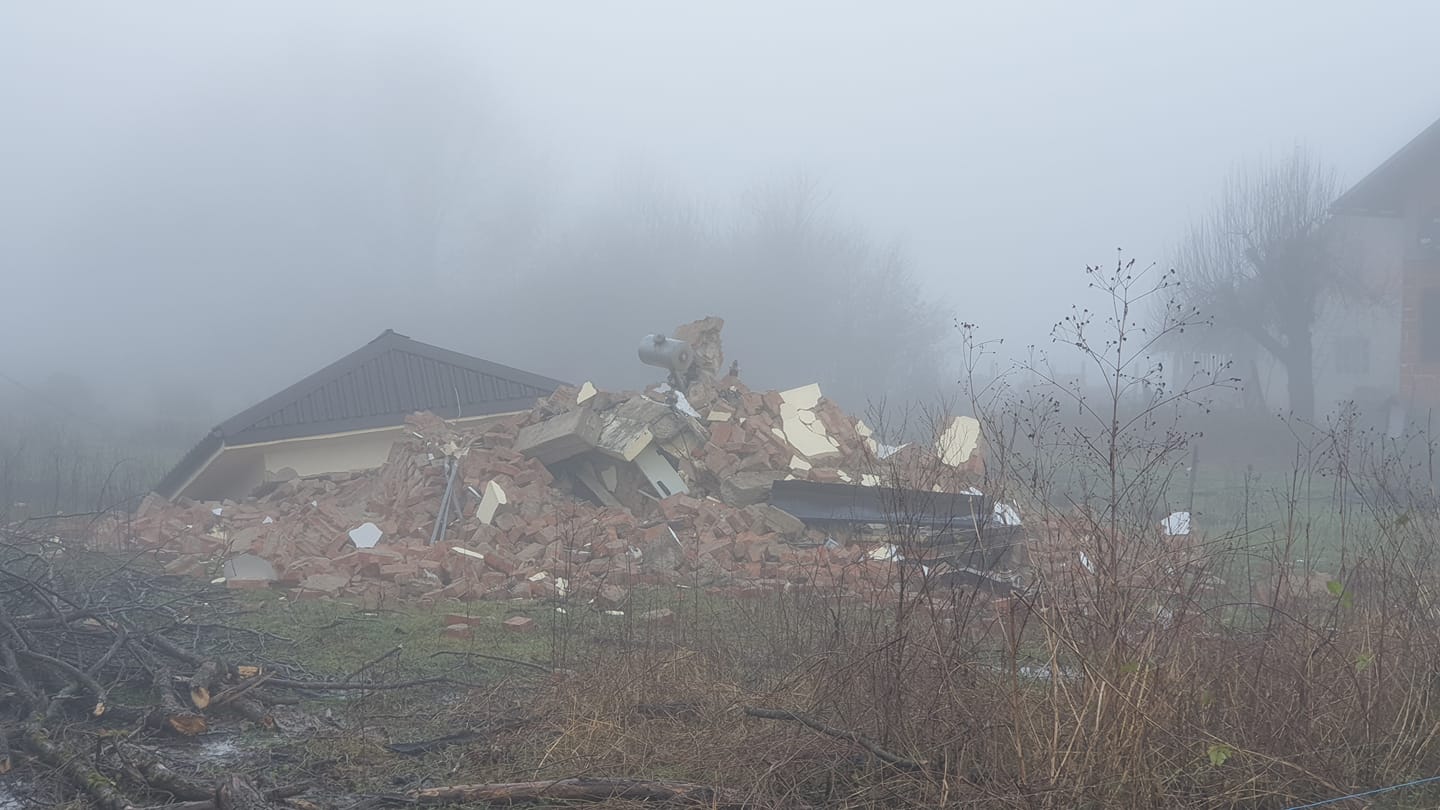
Unsure of how busy the roads would be, I left home in Varazdin at 5 am, picking up TCN colleague Marc Rowlands from Zagreb on the way. Never having done anything like this before, we decided to start in the small village of Majske Poljane, where four of the seven deaths had occurred, and where the mayor had claimed that only 10% of buildings were not damaged.
The mayor was not exaggerating.
The fog was thick at times, and our hearts sank the more we drove along the narrow main road. How does a community recover from something like this? Rebuild?
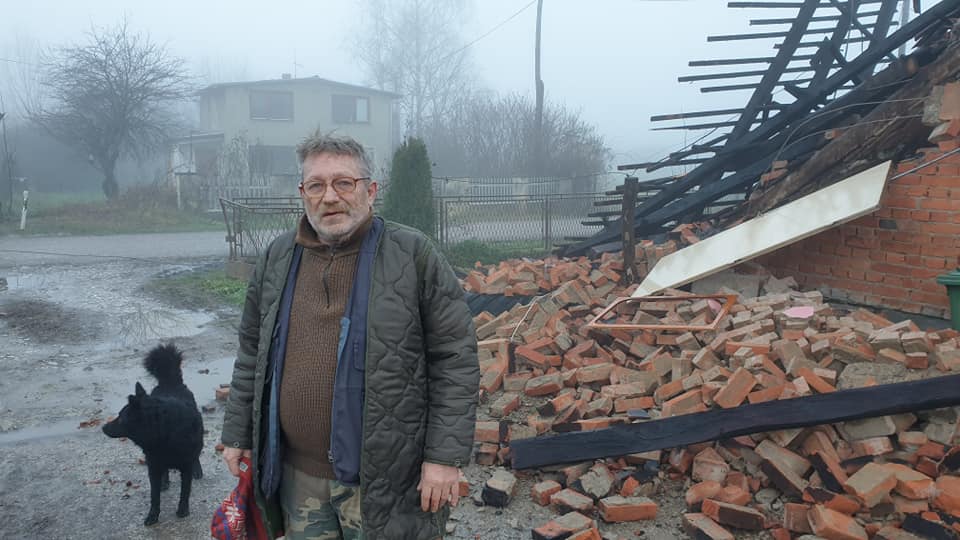
A shell-shocked man was standing by the side of the road. His house was more or less intact, but he was alone and without power. His neighbours had not fared as well. On hearing I was English, he told me that he was a war veteran and had fought side by side with an Englishman in Vinkovci in 1992 in the 109th Brigade.
"Was his name Steve?" I asked, the only Englishman I knew in Vinkovci who fought for Croatia (and DEFINITELY the only Englishman to open a pub in a field in the middle of nowhere in eastern Croatia).
" Yes, Steve. He probably will not remember me, or recognise me after all these years." I suggested we try and sent Steve the photo above to find out - the reply came back that the face was familiar. Such is the smallness of the village that is Croatia.
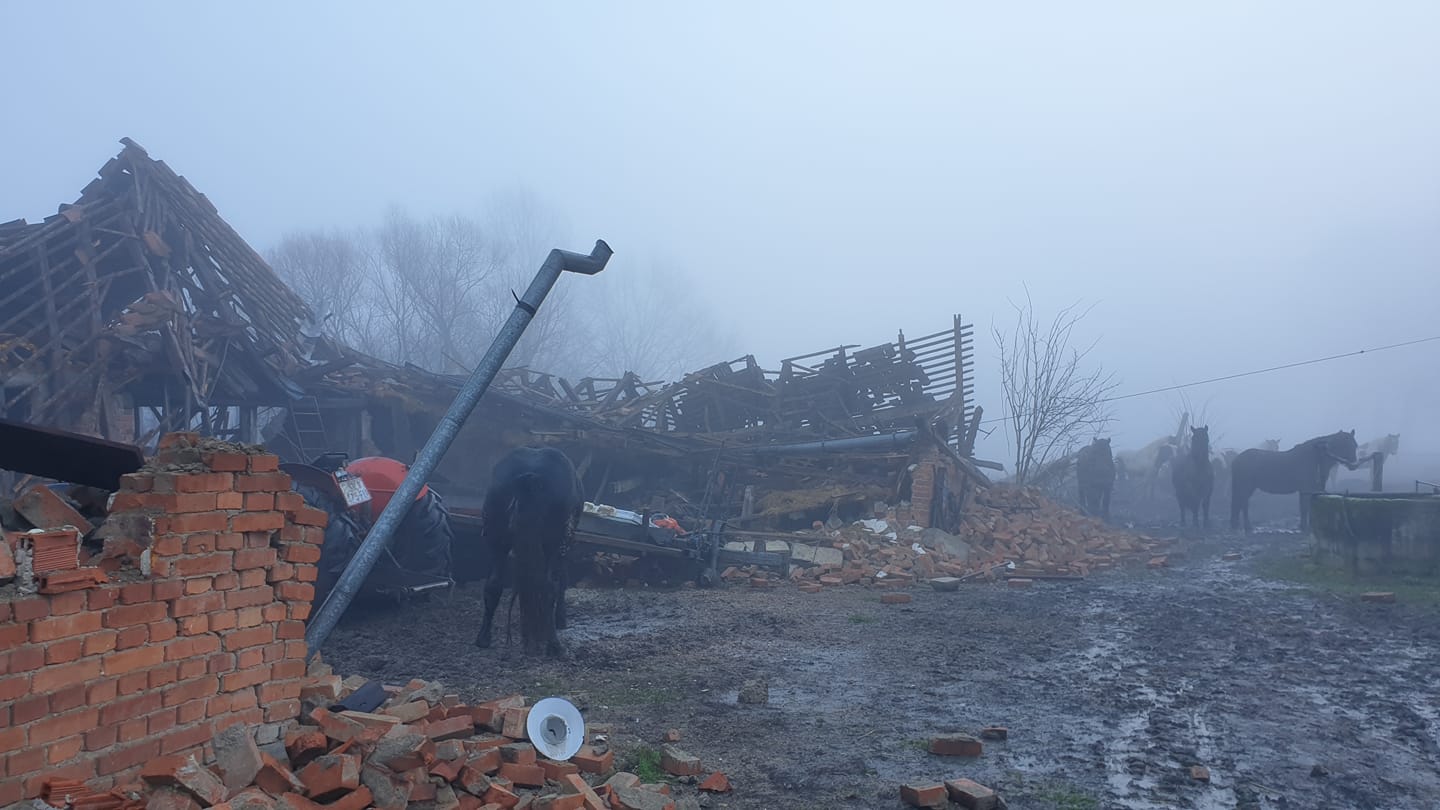
While Vladimir's house was in reasonable condition, the same could not be said of the neighbours' house across the road. Yesterday, this had been an inhabited home. Today, inhabited only by at least 10 horses that I counted, one of which was tied to a tractor. All were shellshocked.
I told various media colleagues I came across today about the horses, and they featured on the national news this evening, and I recently heard that a container of help has arrived at the house, including help for the horses.
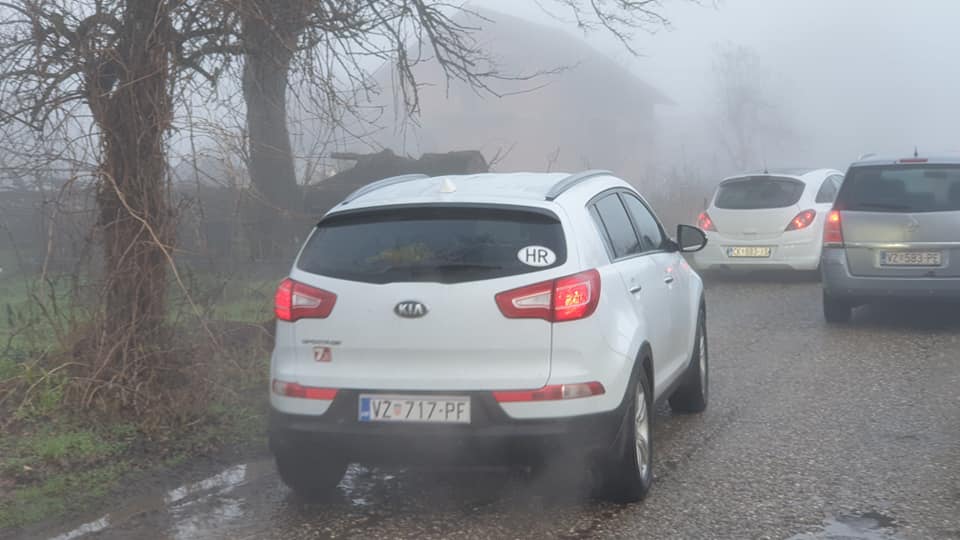
Ours was not the only car with Varazdin plates in Majske Poljane. They came from Varazdin, Cakovec, Zagreb, Vukovar and Bosnia. Volunteers, Croatians and foreigners with their cars filled with food, blankets, water, clothes, looking for locals to donate to, to help them through this difficult period.
Vladimir had already received a visit from the Red Cross yesterday, and they brought food, blankets and clothes. He took only a little food, as the need for the rest was perhaps greater with others.
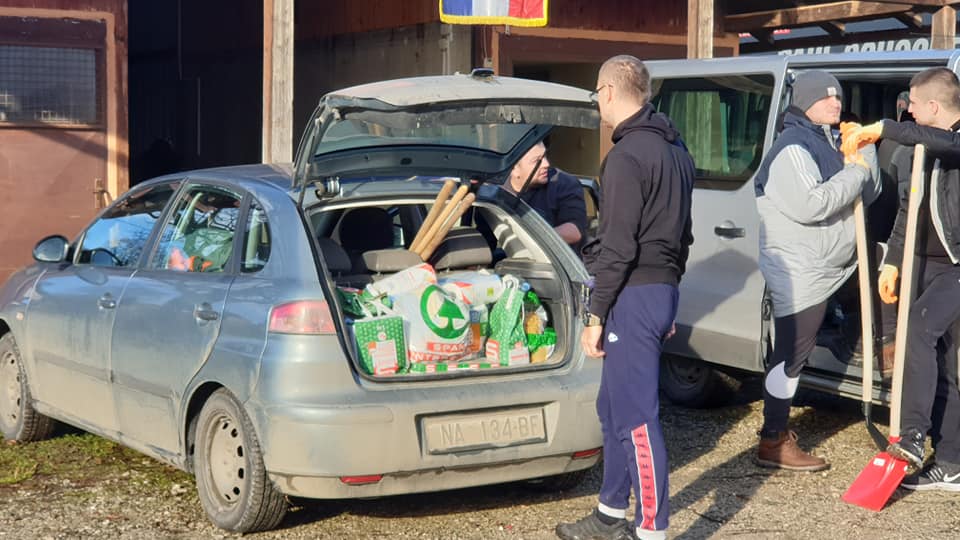
It was a theme of the day - cars from all over Croatia (here, Nasice) filled with supplies to help the people of Majske Poljane, Glina, Petrinja and Sisak.
Of all the countries I have lived and travelled in, never have I seend a nation come together in time of crisis in the way Croatia does. As my heart was breaking with the horror scenes all around, it was also beaming with pride at the efforts of my adopted homeland.
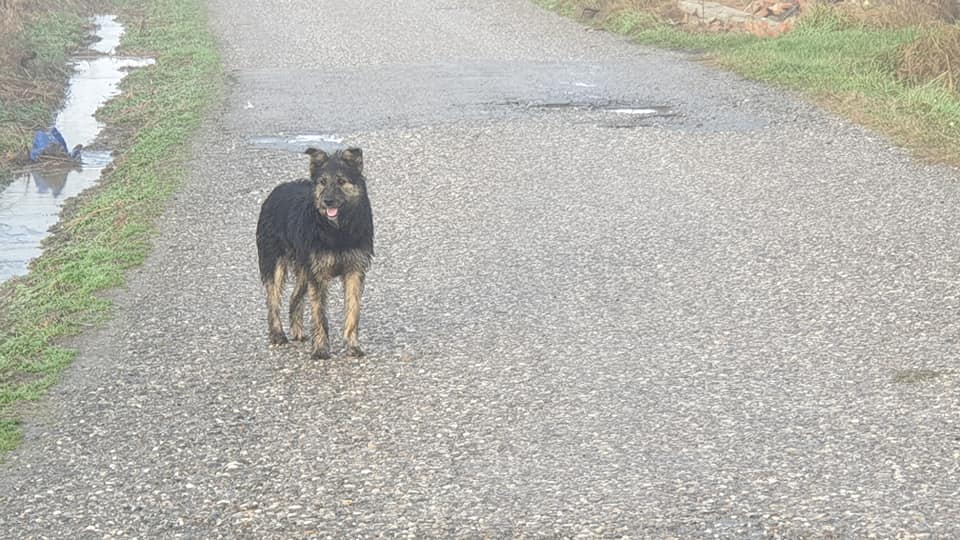
The humans of Majske Poljane may have been confused by what had happened, and so too were the animals. From those horses to the bleating sheep and many dogs either wandering around confused or guarding houses which no longer existed, the loneliness and loss of direction of beloved pets was as poignant as anything I saw today.
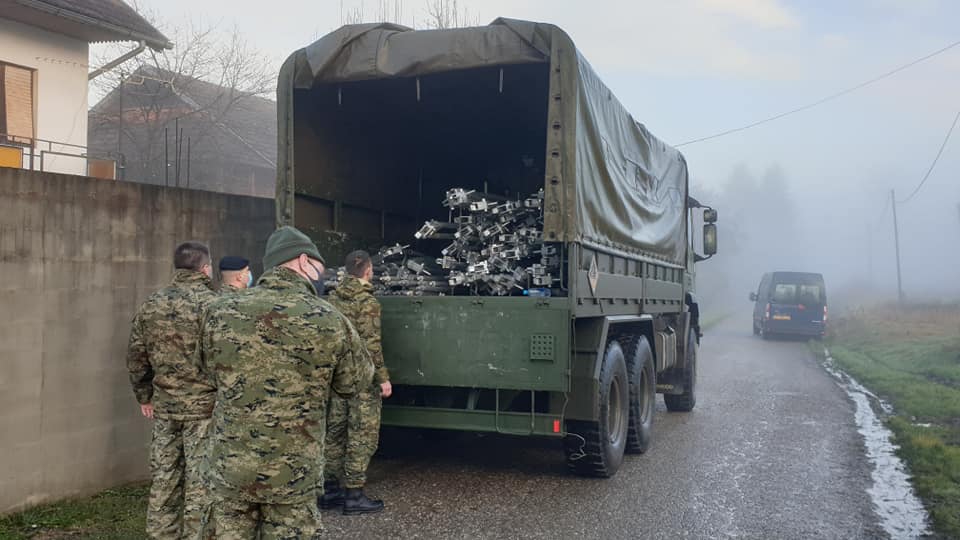
We made our way back through the mist to the other side of Majske Poljane, to be greeted by the Croatian army, just part of the emergency response.
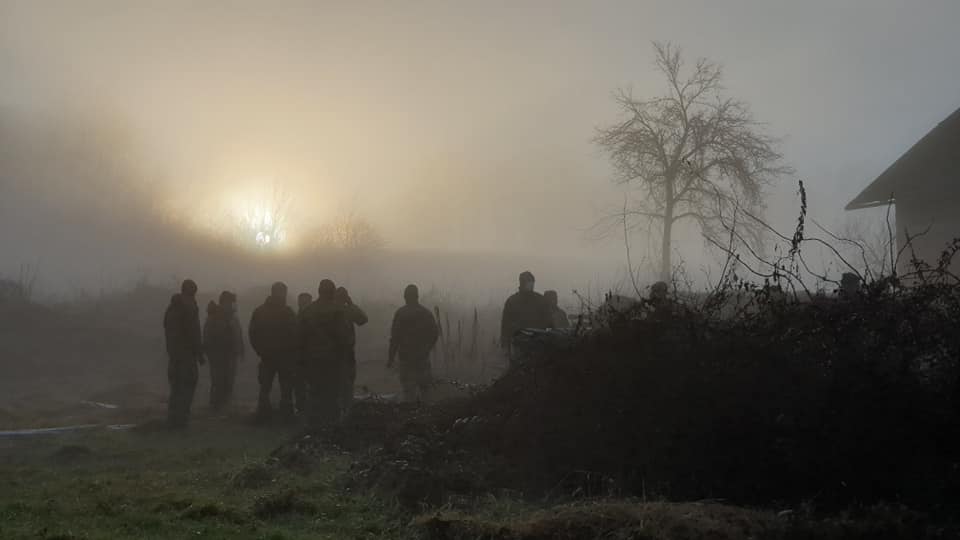
They were soon at work, setting up temporary shelters.
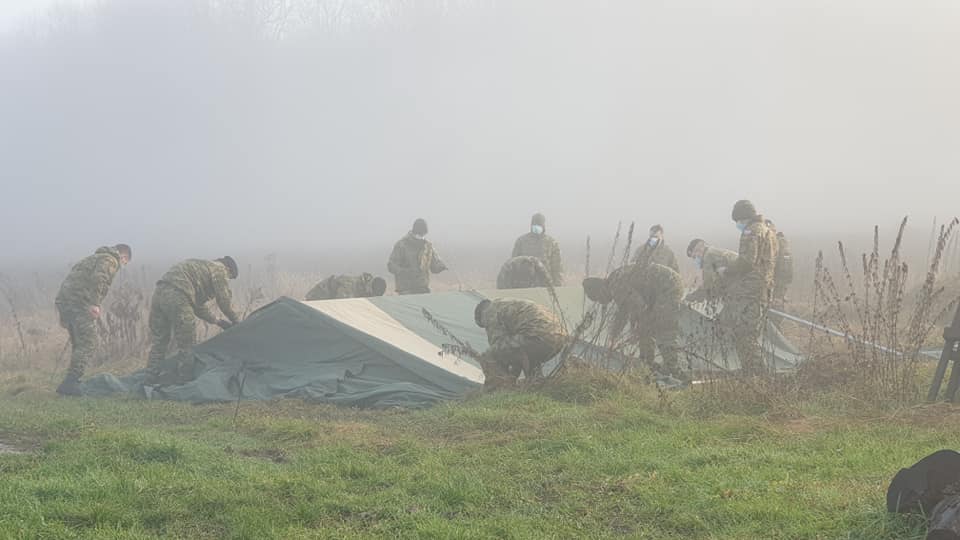
Great teamwork, obviously well-practised.
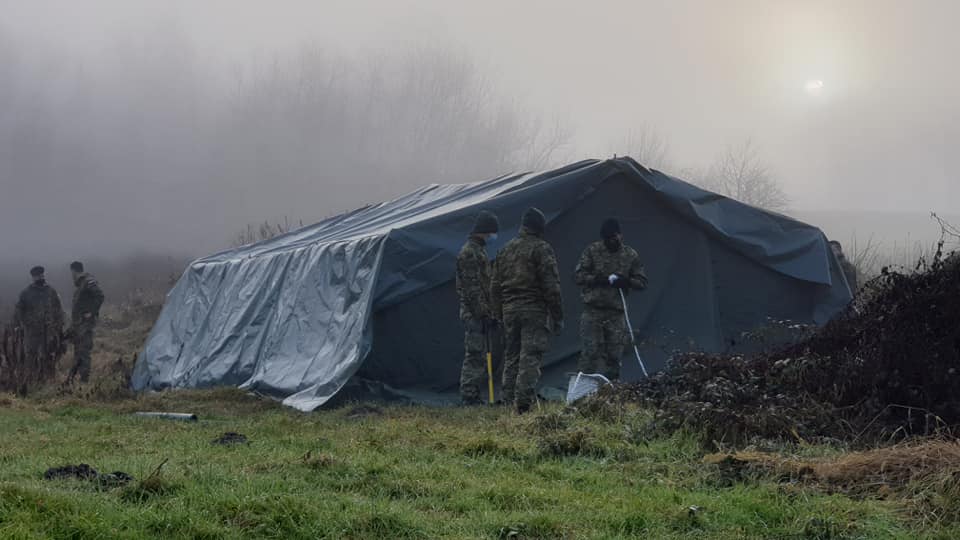
And within 15 minutes, mission complete for the first tent.
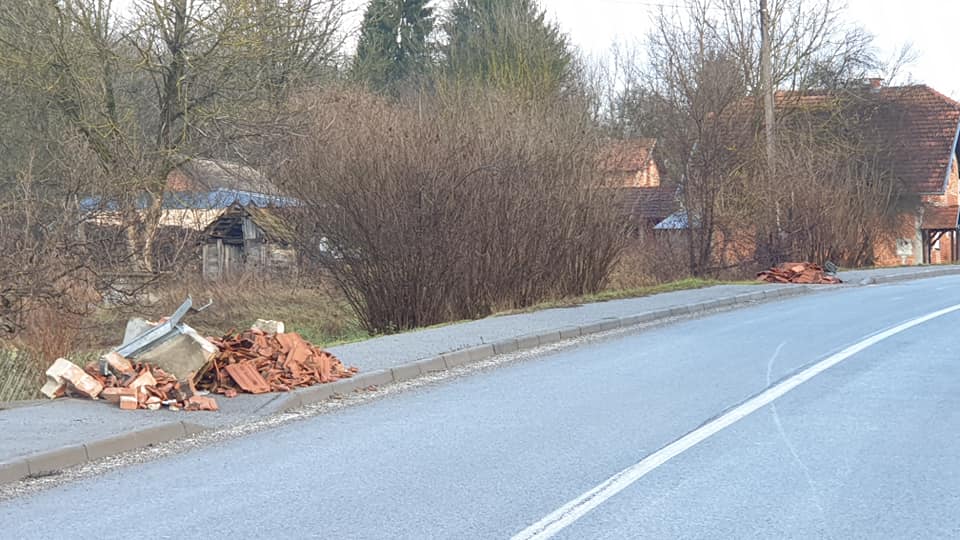
We headed on to the nearest town, Glina, which was also badly affected. On the way, by the side of the road, piles of rubble from the damaged houses. Neatly arranged, waiting for the authorities to collect them.
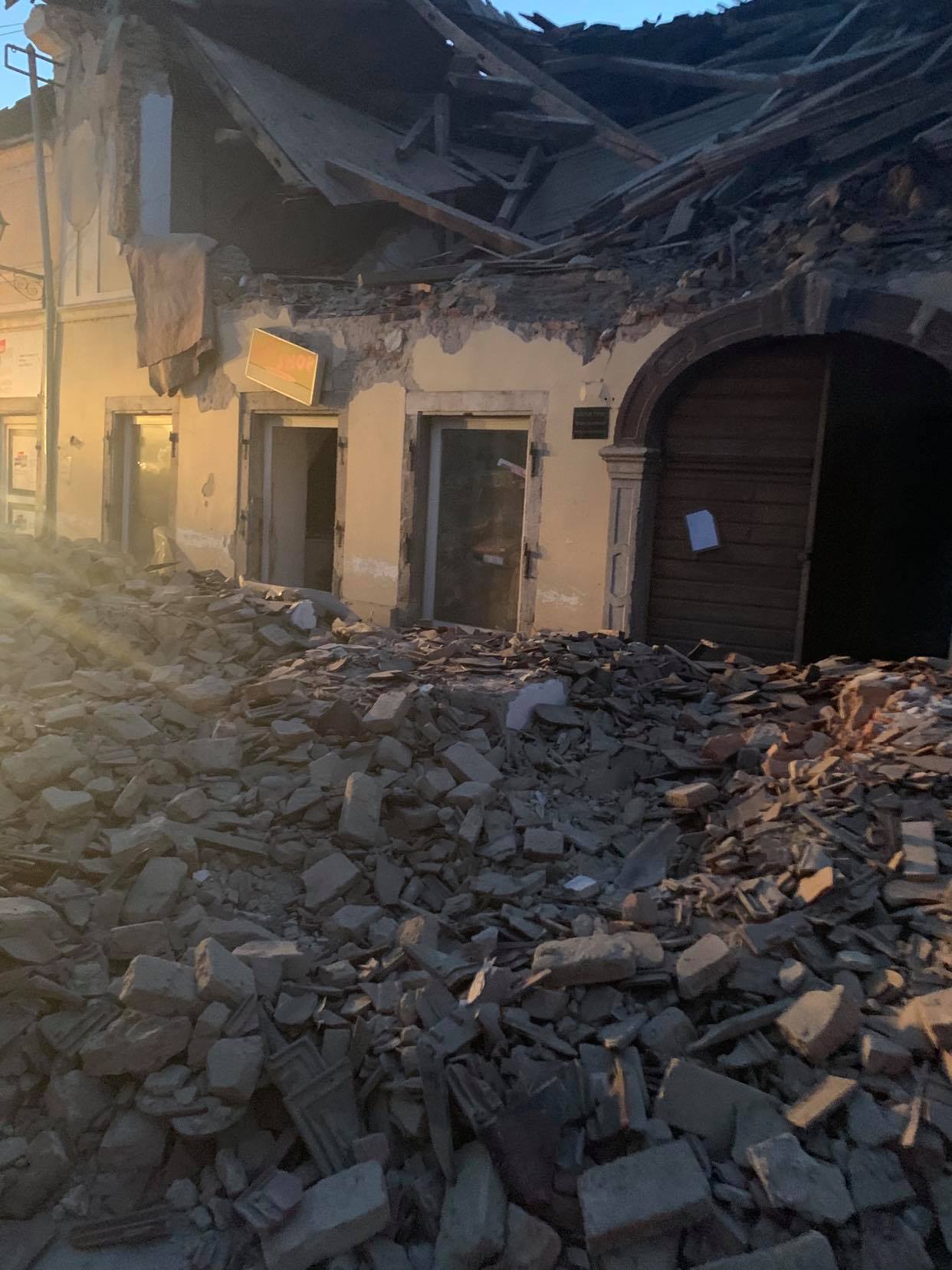
This is the photo a friend from Petrinja sent me yesterday. Cleaning this up was going to take forever, surely?
We couldn't believe how clean the streets of Glina were, until we saw the local teams in action.
One section complete, on to the next.
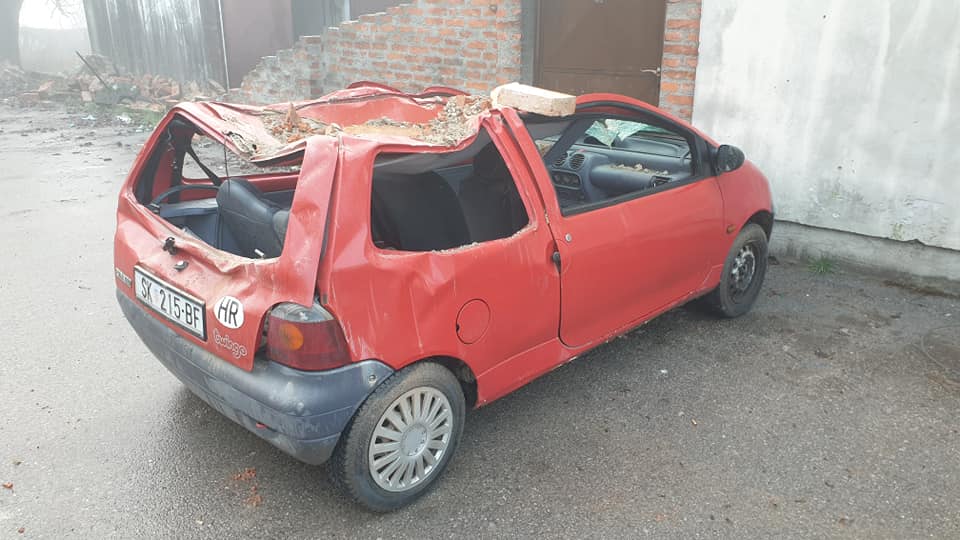
Some things will be impossible to fix.
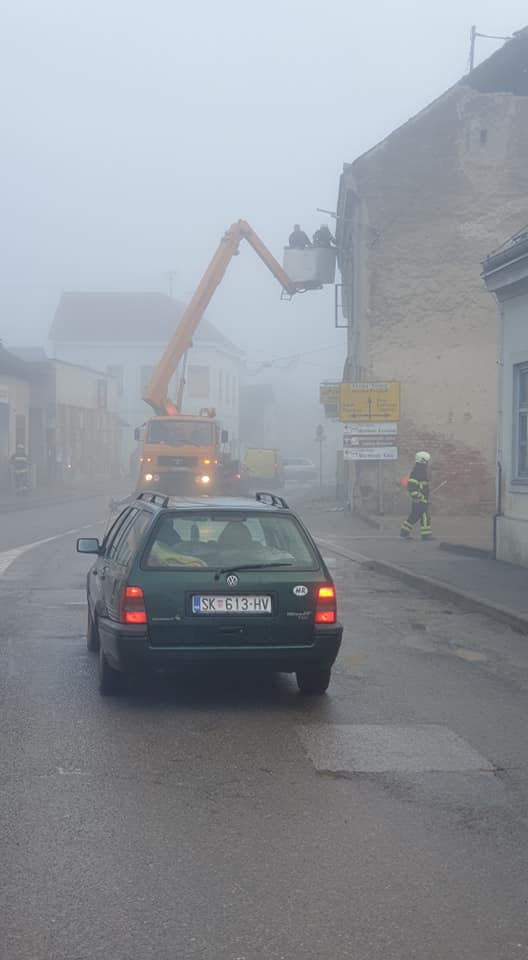
The fire brigade was out in force, removing loose debris and making buildings as safe as possible. Lots of loose chimneys were removed in the region today.
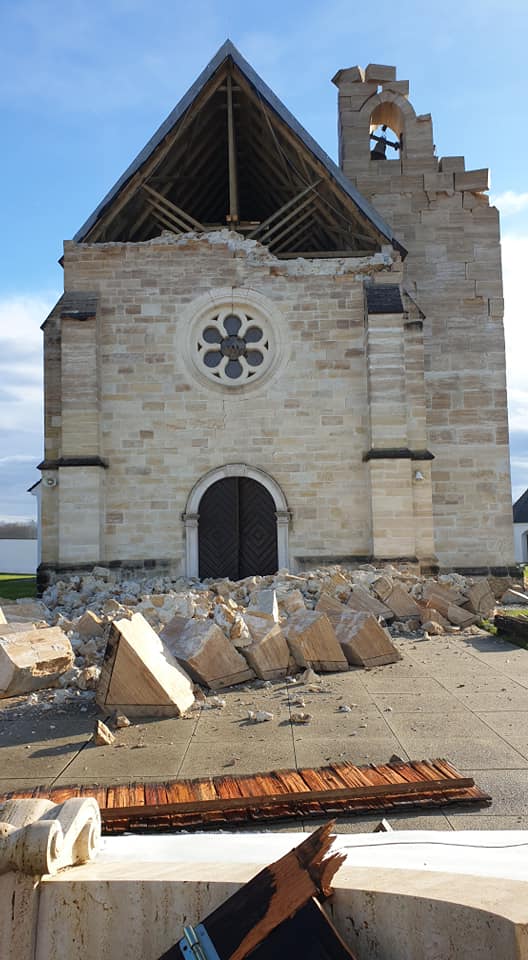
From Glina to Petrinja, but there was plenty to observe on the way. A beautiful stone church in Gora, victim of the quake, huge chunks of stone lying in its gardens. A local told me that the church is only a few years old, having being rebuilt after the Homeland War.
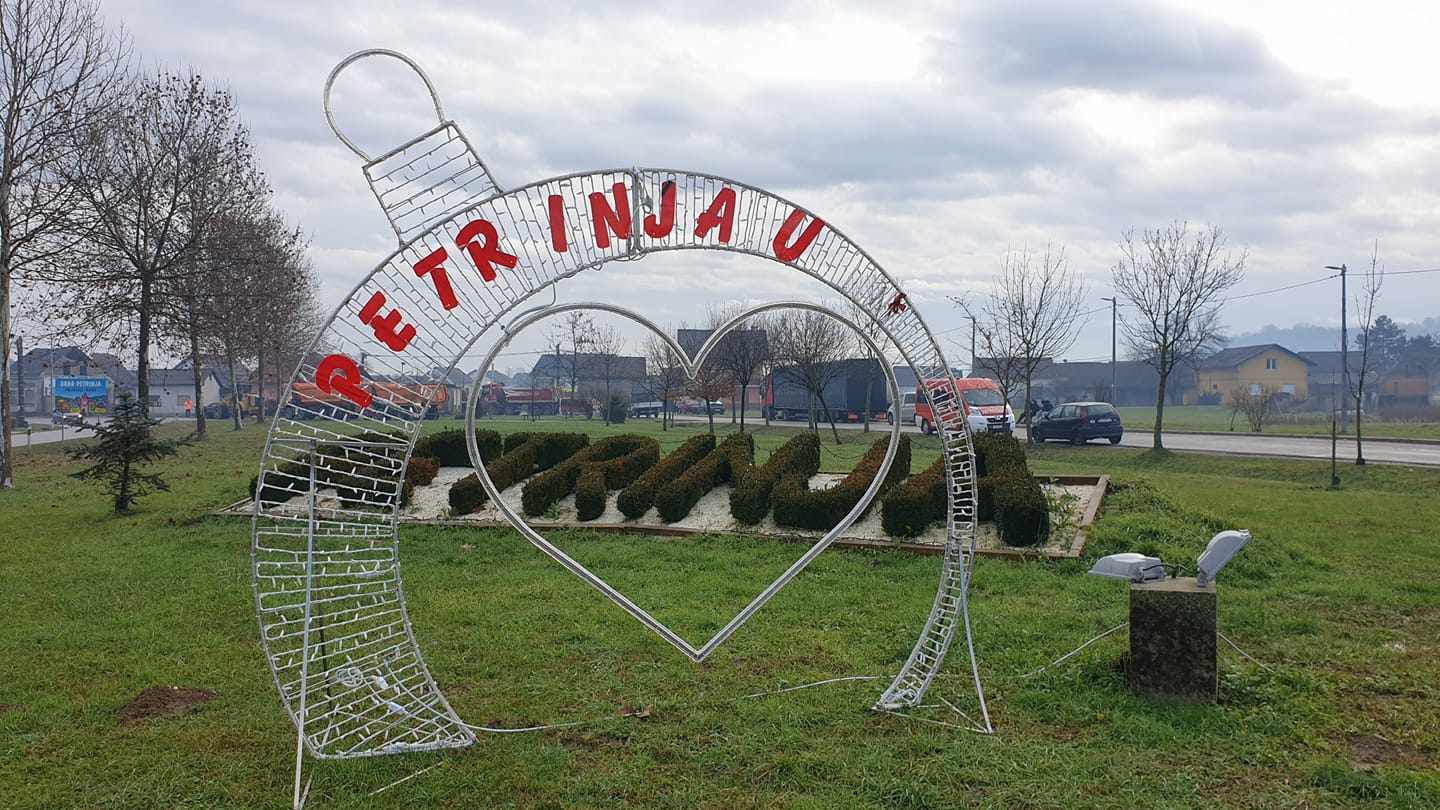
The entrance to Petrinja.
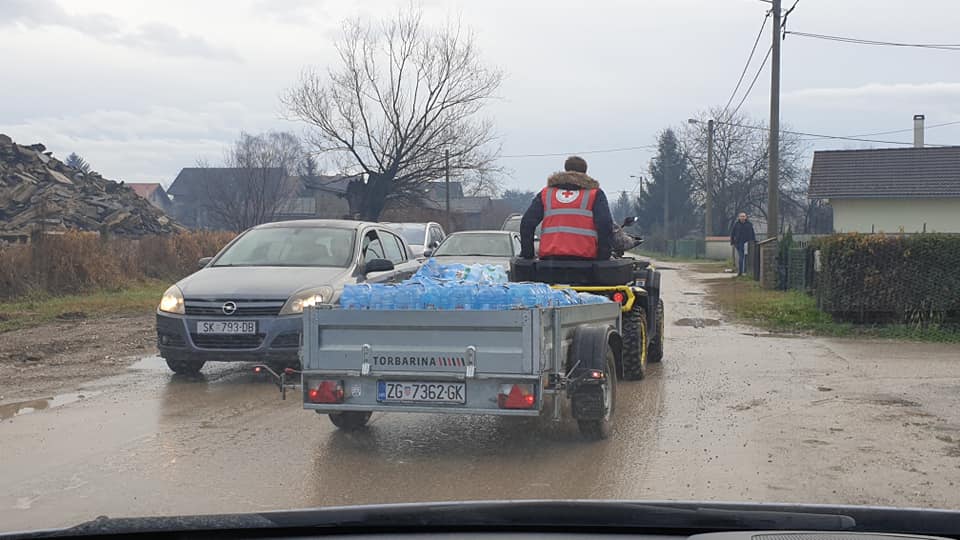
With no fixed agenda, we decided to follow things that interested us. Such as the Red Cross on quad bikes delivering emergency water.
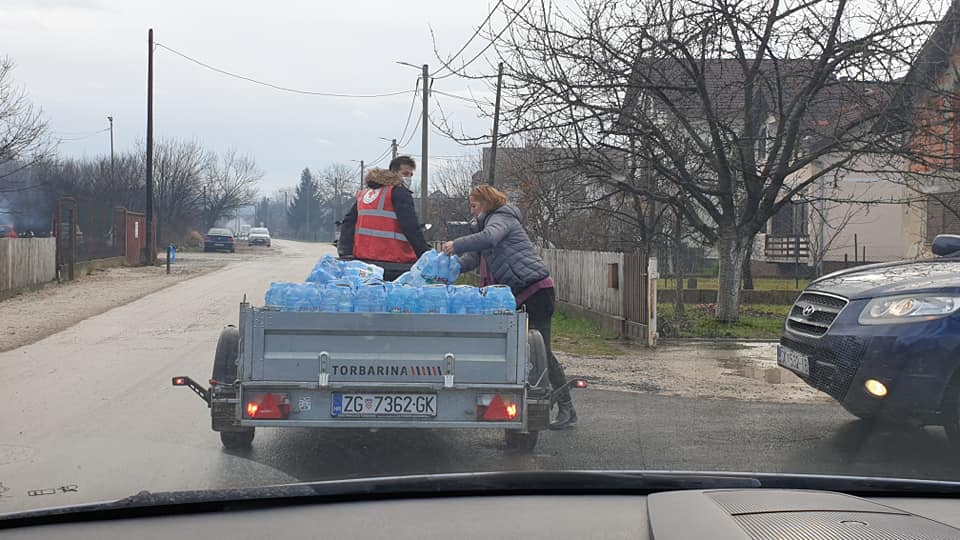
It was hard to keep up as they went house to house, with local residents coming out to collect their allocation. Efficient, innovative, and very effective.
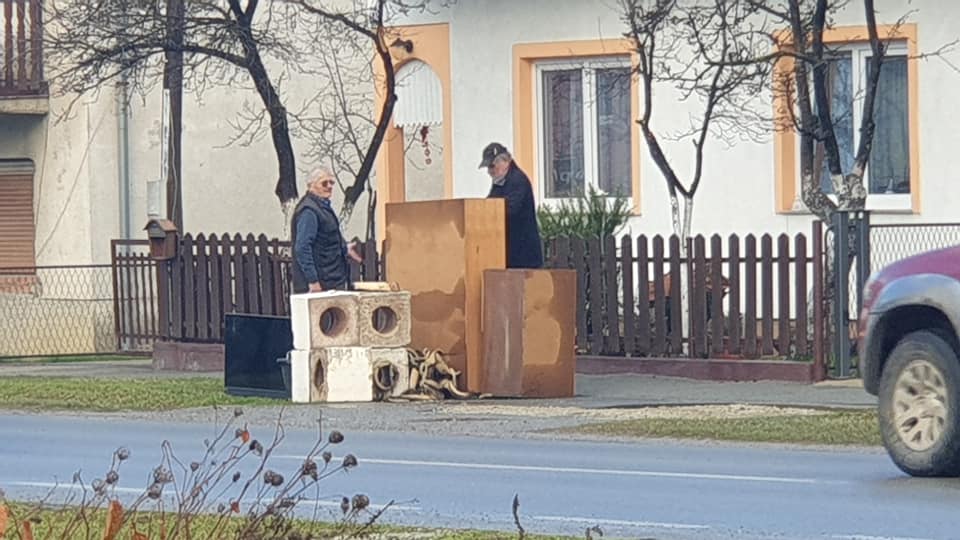
One of the most heartwrenching sites of the day were the numerous families sitting in their gardens and yards outside, with basic supplies of food and water. Others were just standing there, looking lost. With the threat of more tremors, no electricity, and nowhere to go, many just sat outside in the cold and waited. There were so many incredible photos to be taken, but neither of us wanted to be that intrusive.
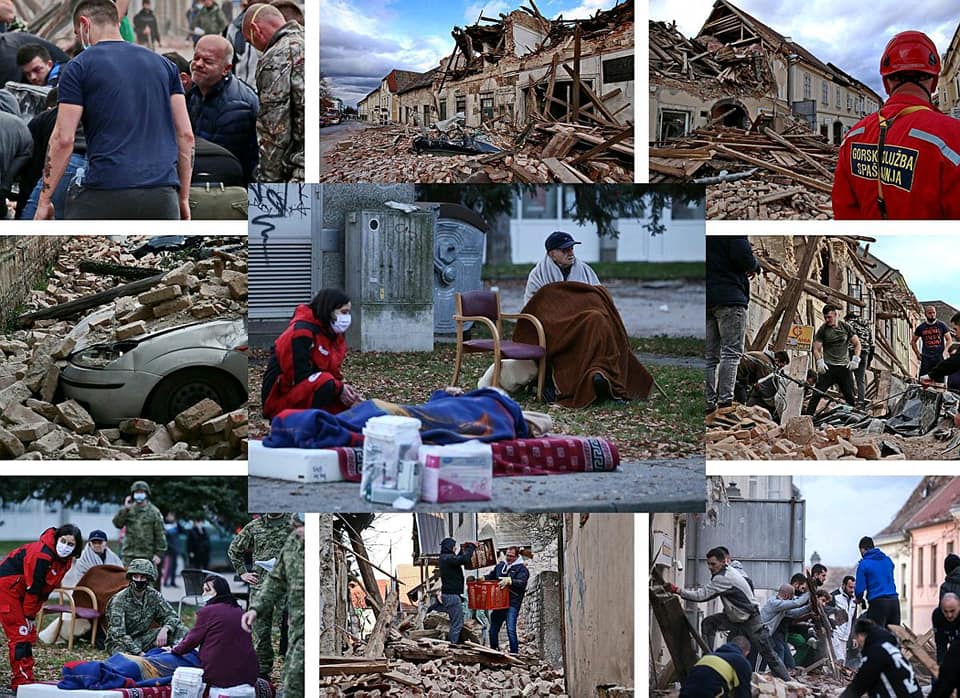
But perhaps a flavour in this collage from a LinkedIn contact.
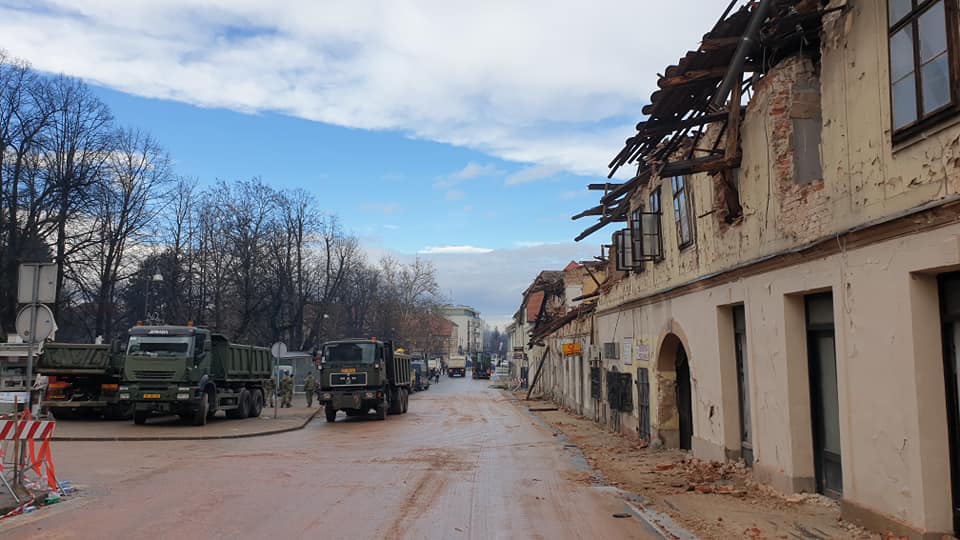
And so to the centre of Petrinja, whose collapsed buildings have become the most iconic of this latest disaster.
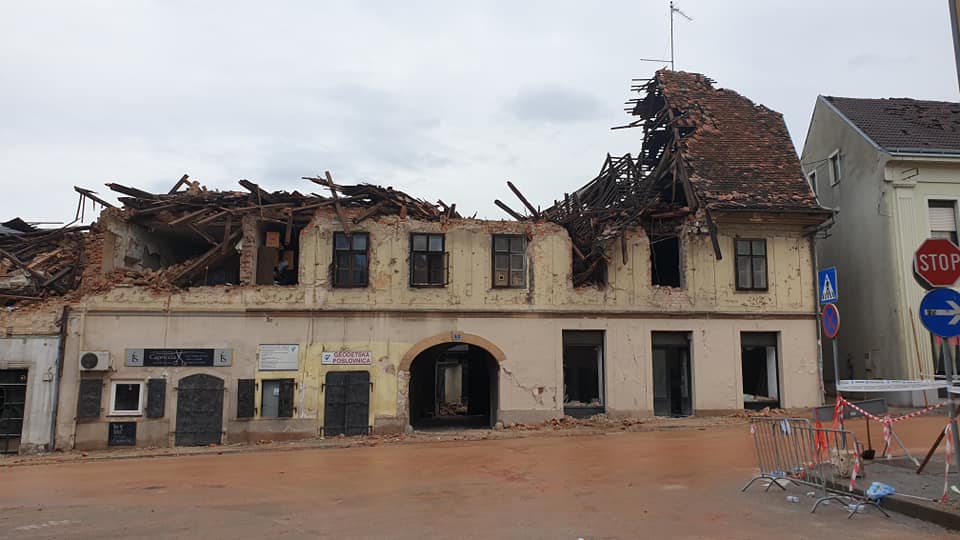
Horrifying.
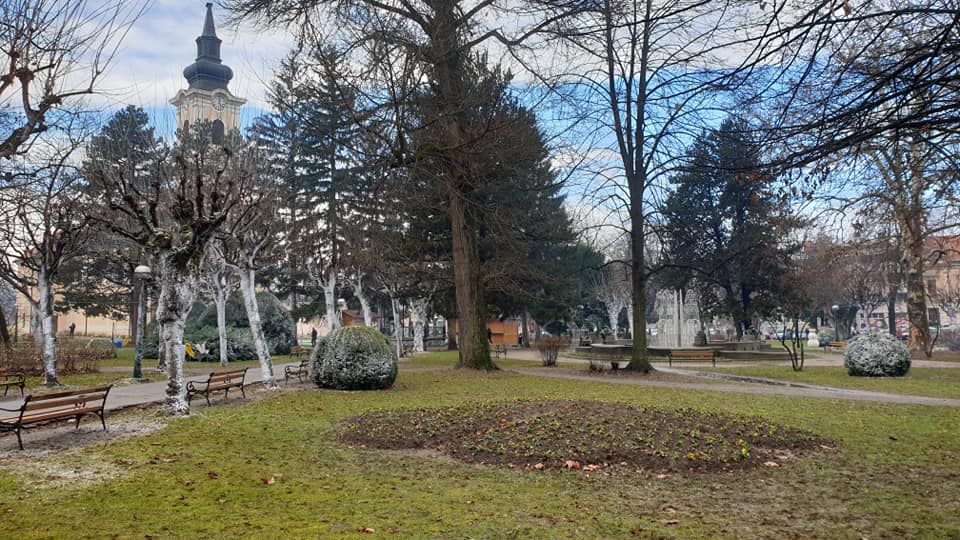
But then, the strangest thing... Look the other way into the centre of the square to find a beautiful Advent in Petrinja park, seemingly oblivious to the chaos all around.
A video tour of a tale of two Petrinjas in one square.
And I thought back to my friend's photo the previous day - the streets of Petrinja were incredibly clean so soon after such a catastrophe.
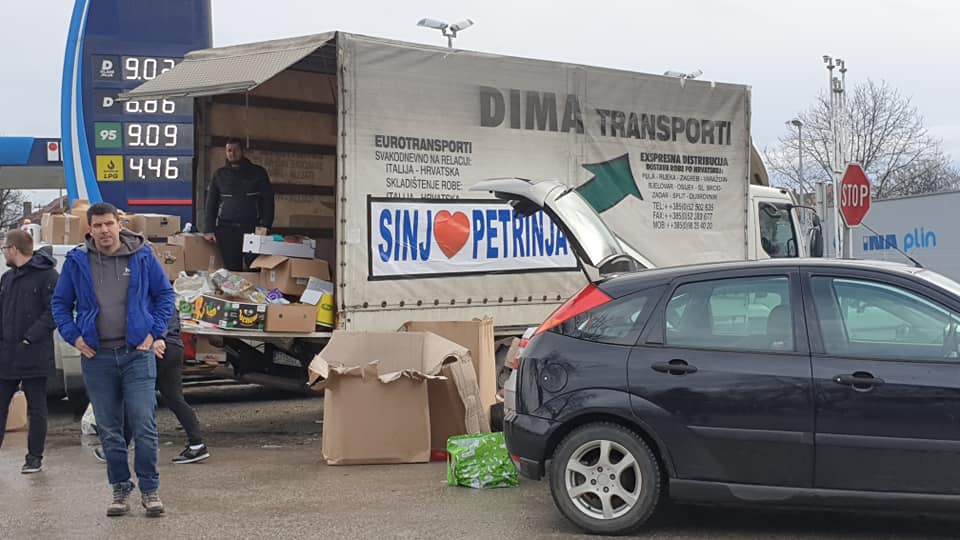
Another reason, perhaps, why people were just sitting around in their front gardens was that there was nothing open. Cafes and restaurants have been closed for weeks due to corona, but the shops and supermarkets were also shut. But there was little chance of the people of Petrinja going hungry, as there was help from every corner of Croatia. I stopped to take a photo of 'Sinj Loves Petrinja.'
"What would you like?" asked the man in a strong Sinj accent.
"I would love a cold beer," I replied.
"Sorry, no beer but we have lots of other things. Take what you need."
"Haha, I was joking. I am a journalist, I don't need anything but thank you."
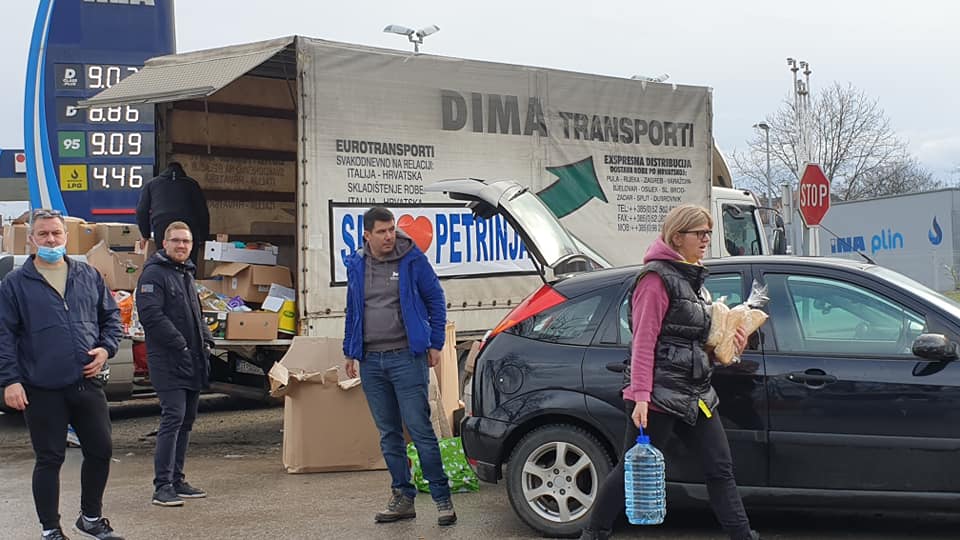
A woman approached asking if they had any bread, and she took what she needed for her family. Such things happened all over the region, gifted by people from all over the country, today - it was heartwarming to see.
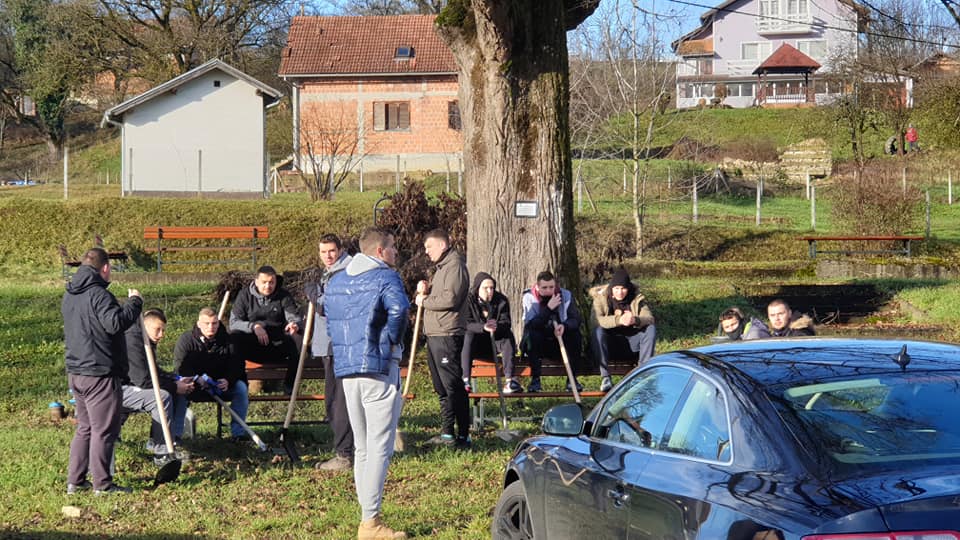
And everywhere, the volunteers, waiting to be allocated their tasks. Everything is being very well-coordinated by the local civil protection units.
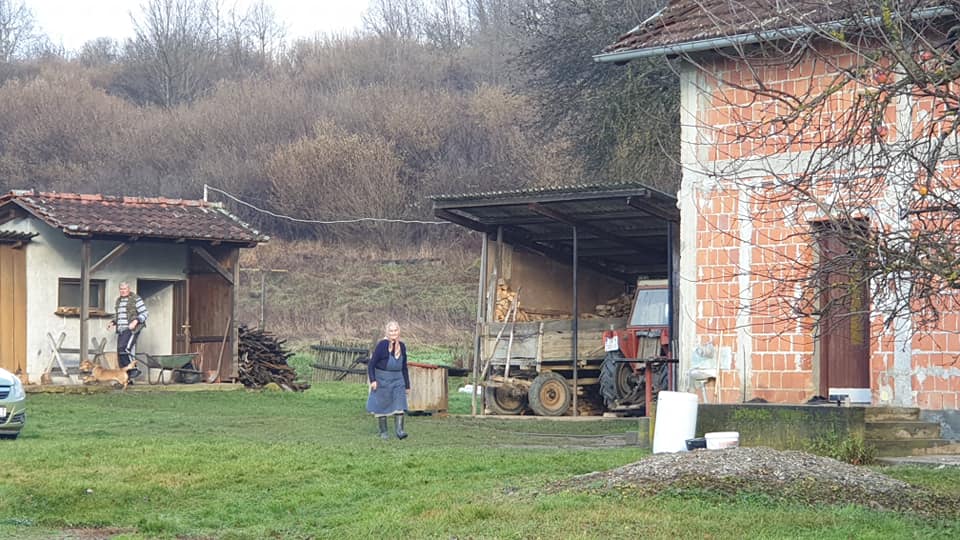
Marc wanted to take some photos of something along the road, and I found myself watching this old couple whose house had been damaged, urgent repairs to the roof a priority.
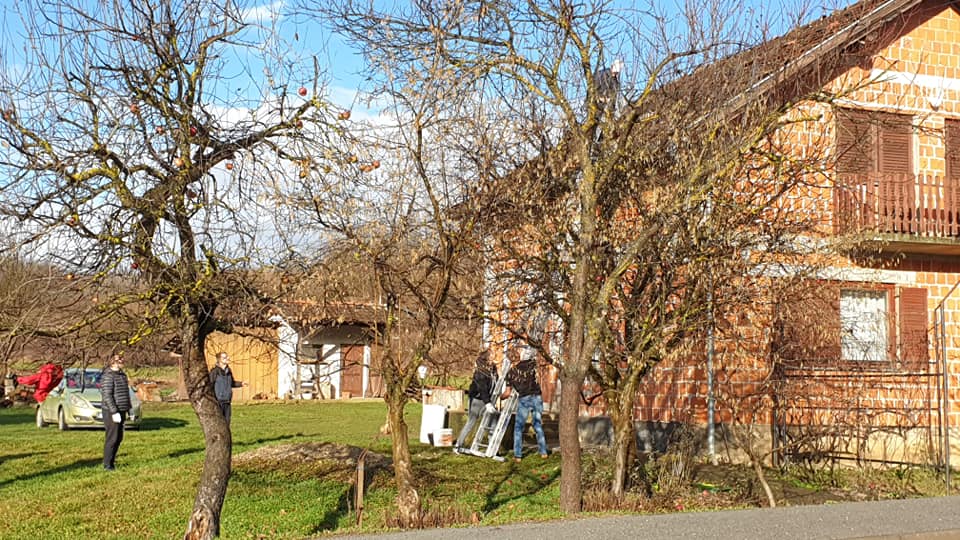
Within minutes, a team of volunteers appeared with a ladder and set to work. Such things happened all over the region, volunteers from all over the country, today - it was heartwarming to see.
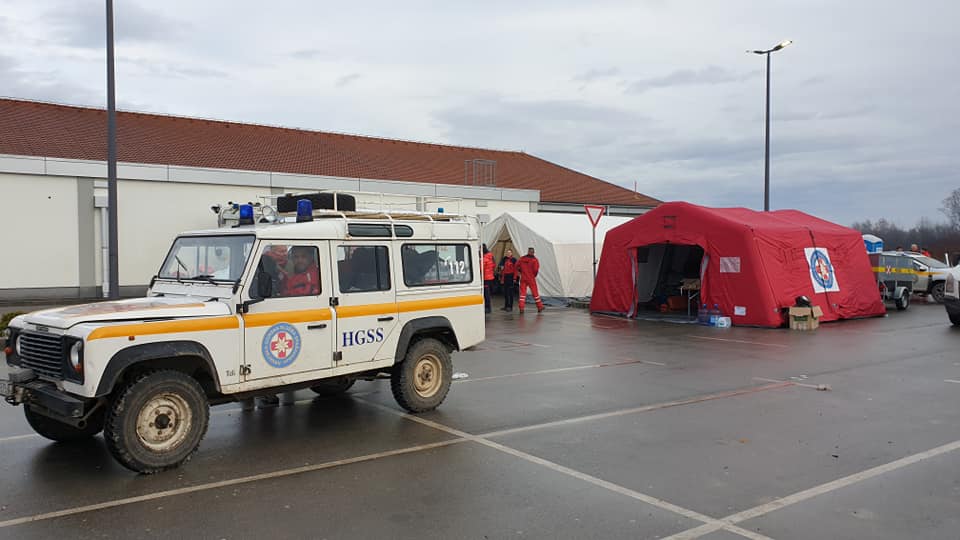
There was one appointment I had that I was keen to keep - finally meeting Josip Granic and the amazing team from the Croatian Mountain Rescue Service, whose headquarters were in the Lidl car park.
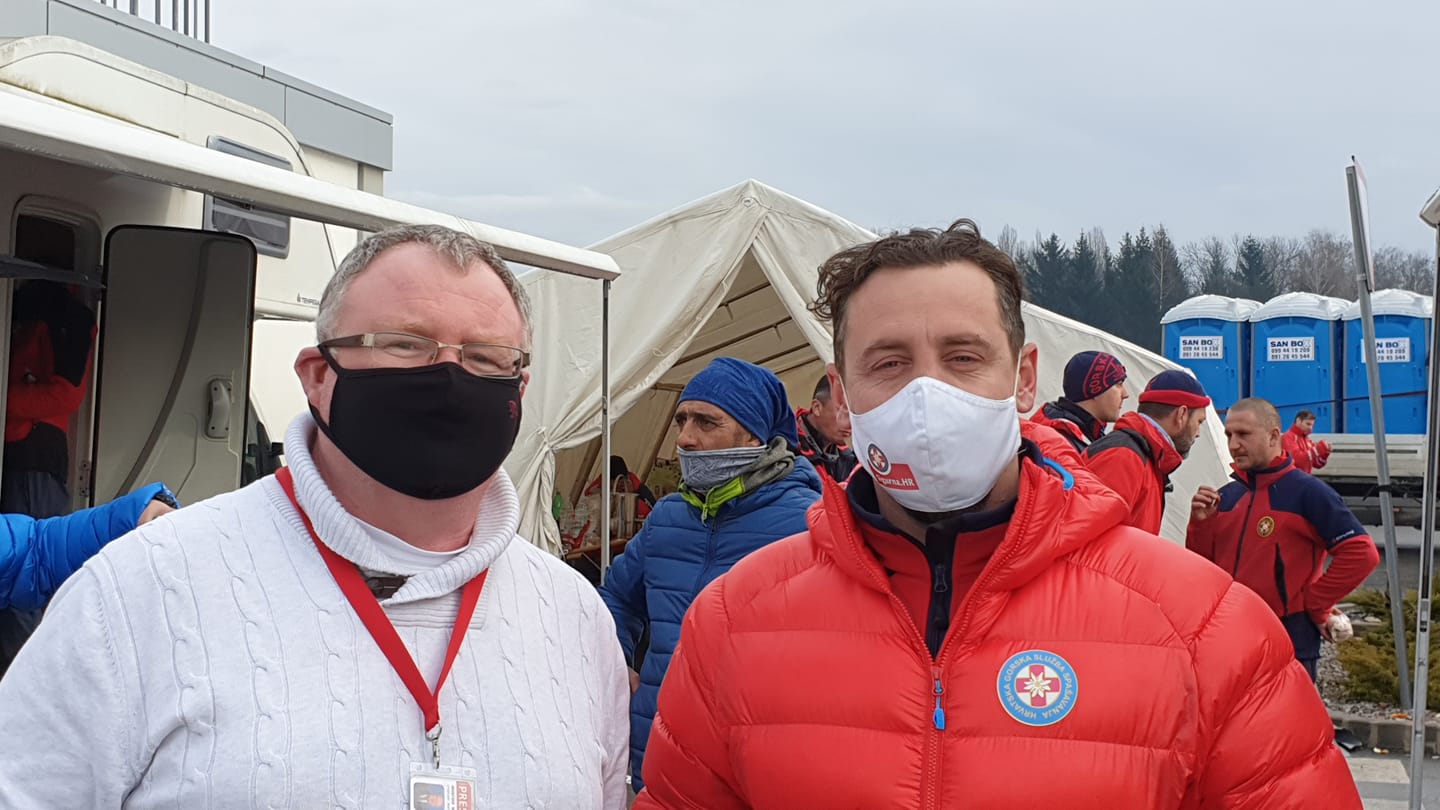
We are curiously bonded by both being unlikely male models (ok, he far more likely than me) in the Varteks 'Imperfect Guy in a Perfect Suit' campaign. Josip is a big TCN fan and was very helpful in a great feature on the amazing team at the Croatian Mountain Rescue Service by TCN earlier this year - Meet HGSS The Croatian Mountain Rescue Service.
Despite working through the night without any sleep, Josip found time for an interview with Marc, which we will publish tomorrow.
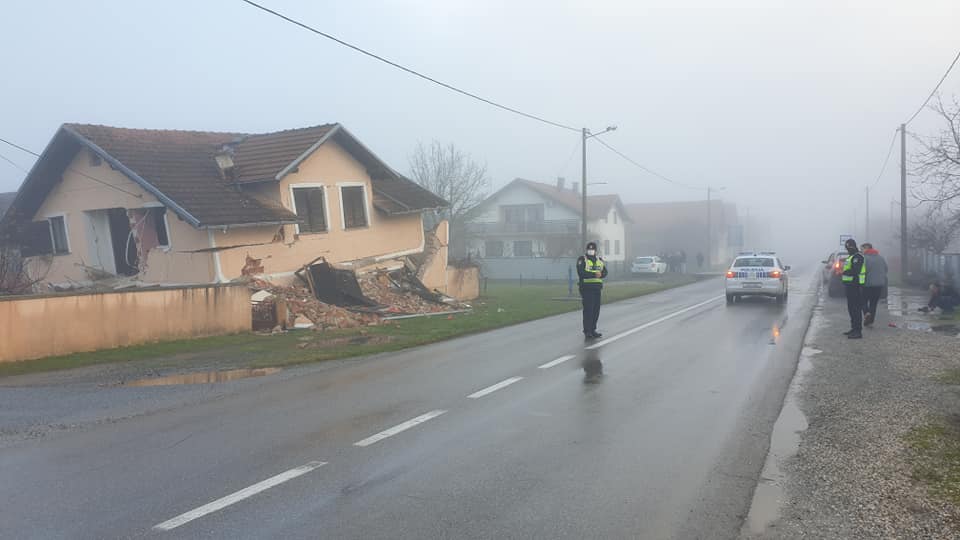
Police road checks in the earthquake era. I was expecting much more traffic congestion, but the police kept things moving.
What the police could not control were more tremors. Alone in the car again as Marc took more photos, the car started to move side to side, and the earth was definitely moving underneath me - a 4.1 earthquake I was to discover later. Par for the course in Croatia in 2020 and nothing to write home about.
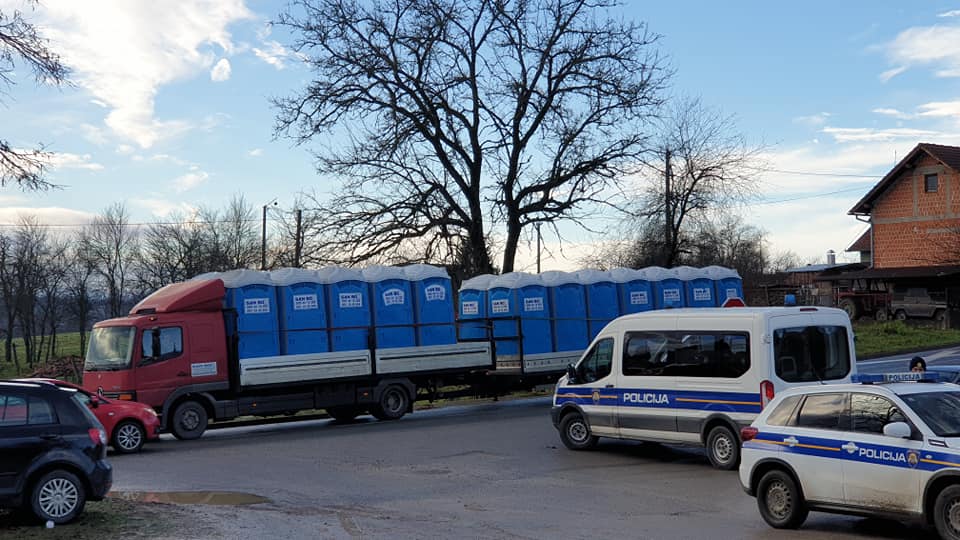
And the traffic kept flowing, bringing the essential items to the locations which needed them most.
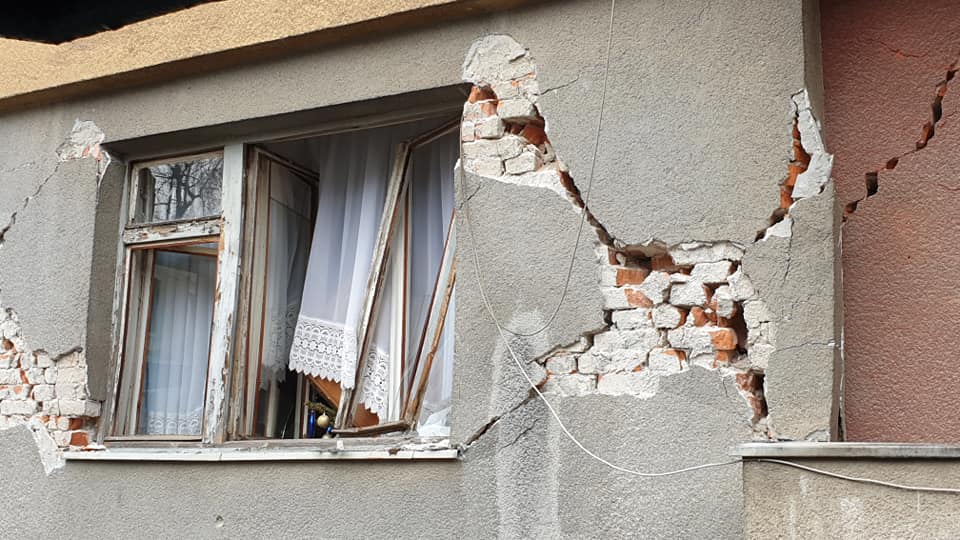
The damage was everywhere, and for all to see.
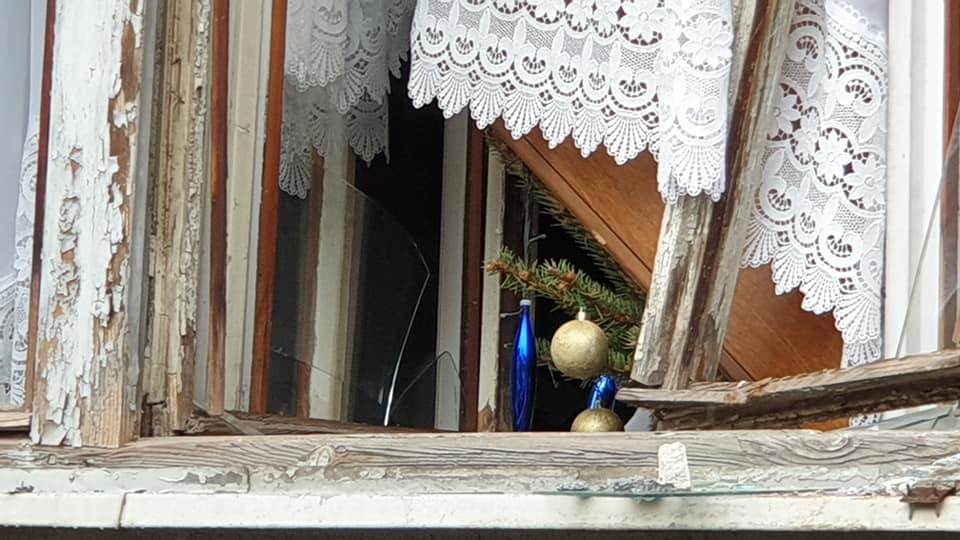
Some with memories of the celebrations of a happier festive season, just a few days ago, when life was very different.
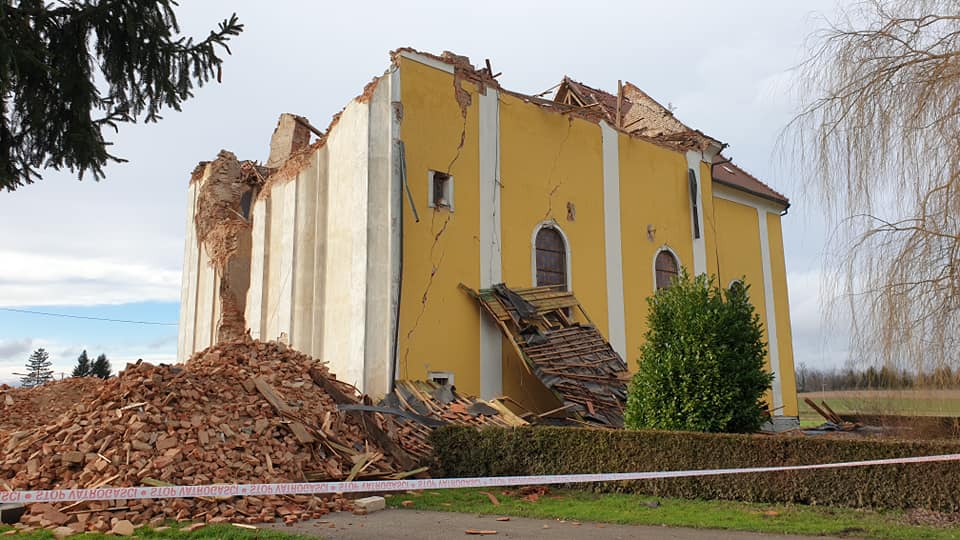
There was time for one more stop before returning to Zagreb - the church in the village of Zazina. Its front and spire no longer there.
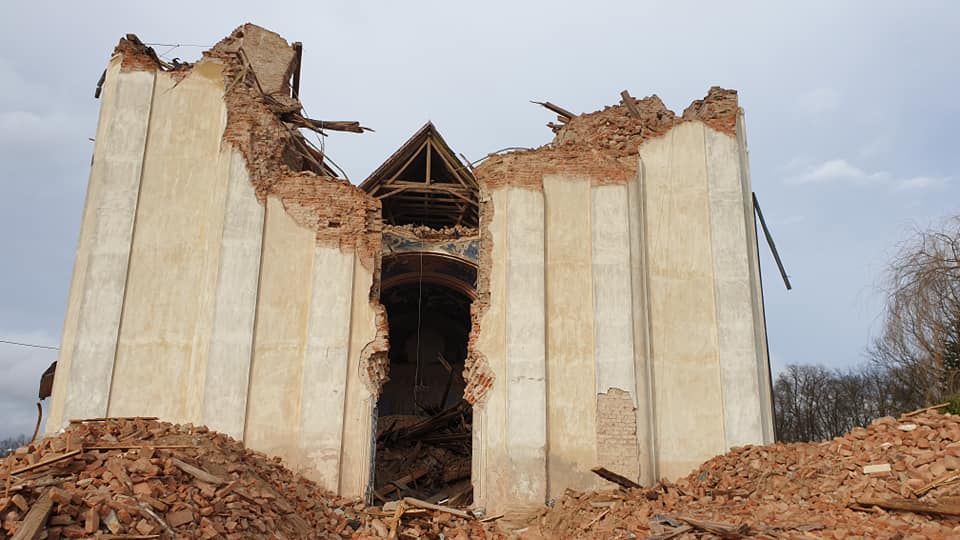
Ripped from the rest of the building.
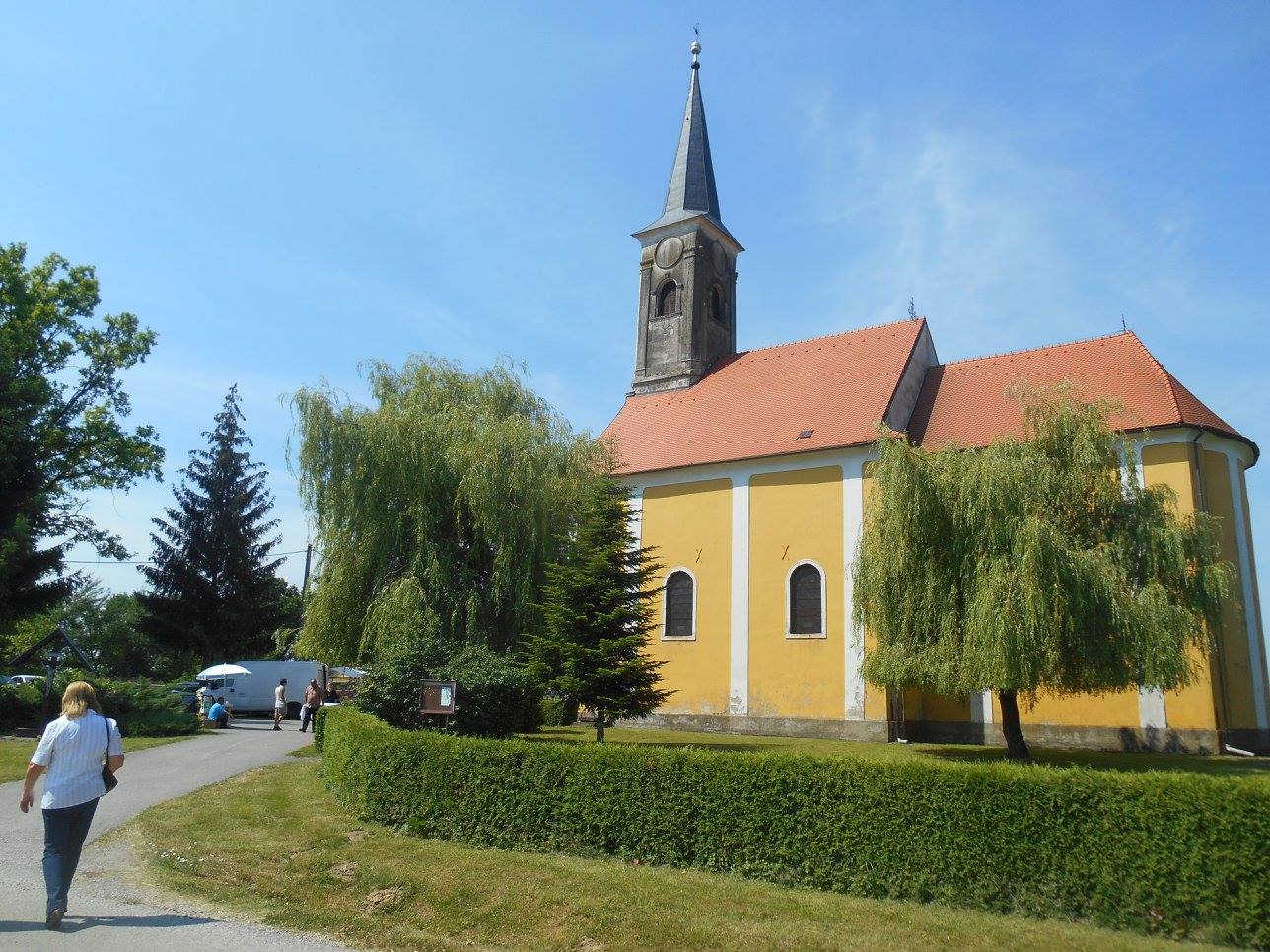
This is how the church had looked just 24 hours earlier. I learned later that the church organist had been cleaning the organ when the earthquake struck, and he was tragically killed.
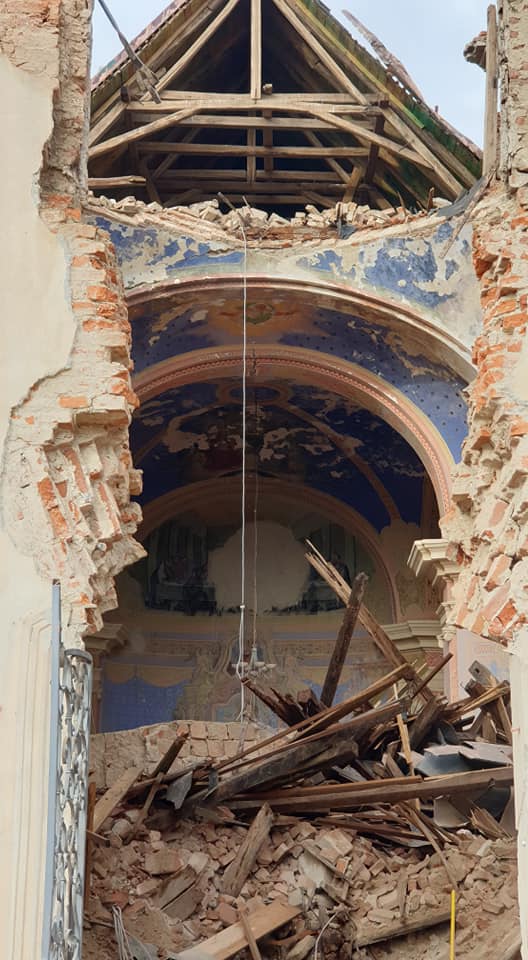
The frescoed walls inside still there to see.
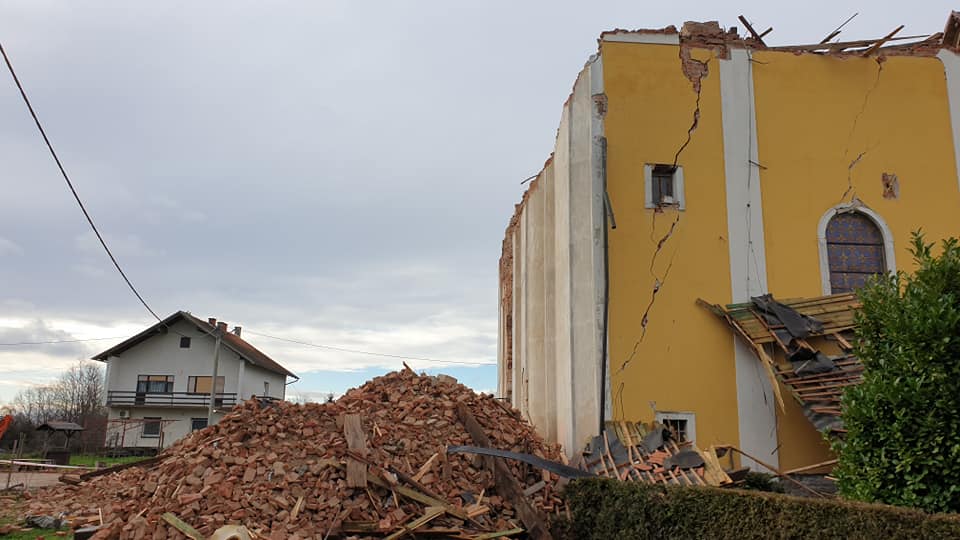
Young versus old, as the neighbour emerged without a scratch. But as we saw with the church in Gora, young does not necessarily guarantee safety from earthquakes.
We drove back to Zagreb in relative silence, each lost in their own thoughts and suffering from the early start and the trauma of the day.
A harrowing day for sure, but also a heartwarming one. Croatians are the most resilient people I know, at their finest in adversity. There are thousands of heroic examples of this being performed on a daily basis at the moment, and I applaud each and every one of them who has risen to the task.
And let's not forget the generosity of the diaspora and international community as well. The response to this disaster has been magnificent, as has been the emergency response. Help IS getting to those who need it most on the ground, and the donations ARE making a difference.
For more on the Petrinja earthquake, follow today's live updates. For more on how you can help and donate funds, food, material and humanitarian aid, click here and here for the details of a special (free of additional charges) HPB donation account for Grad Petrinja.
Croatia Logs 1,850 New Cases of Coronavirus, 65 Fatalities
ZAGREB, Dec 30, 2020 - Croatia has registered 1,850 new cases of coronavirus in the past 24 hours and 65 people have died as a consequence, the national COVID-19 crisis management team reported on Wednesday.
There are currently 8,301 active cases and 2,608 are in hospital treatment and of that number 240 patients are on ventilators.
Today's numbers were registered after 6,322 people were tested in the past 24 hours. Since the outbreak of the epidemic a total of 1,010,668 tests have been conducted.
A total of 208,446 cases of the infection have been registered since the start of the epidemic, and of them 3,860 have died.
A total of 196,285 patients have recovered from COVID-19 so far, with 1,157 recovering in the past 24 hours while 23,094 people are still in self-isolation.
Year 2021 Declared Year of Reading in Croatia
ZAGREB, Dec 30, 2020 - The year 2021 will be a Year of Reading in Croatia, the government decided on Wednesday, which means that a series of activities will be conducted to promote the culture of reading and enable as many people as possible to read with understanding and enjoy it.
The slogan will be "Let us read not to be left without words."
The declaration of the Year of Reading is part of a measure from the action plan of the National Strategy to Revive Book Reading, adopted in 2017 to contribute to the development of the culture of reading.
Culture and Media Minister Nina Obuljen Korzinek said that the decision to declare next year the Year of Reading had been made, among other things, due to the coronavirus pandemic and the fact that reading was one of the cultural activities we turn to in such circumstances.
During the Year of Reading, new activities will be created and carried out -- the award for the best bookstore will be presented, there will be a competition for the best book trailer for primary and secondary school students, "reading ambassadors" will be proclaimed, an international reading conference will be organized, youth award for literature will be presented, little night readings will take place -- all of which will contribute to the affirmation of reading.
"Last week, a European Social Fund tender worth HRK 41 million was launched, and all funds will be additionally invested in programs promoting reading," the minister added.
The decision underscores the importance of reading since models of identification found in literature offer opportunities for a more successful understanding of interpersonal communication, better conflict resolution, and a fuller understanding of what helps or threatens us in life.
Prisoners from Sisak and Glina Jails being transferred to other penitentiaries
ZAGREB, Dec 30, 2020 - The prison buildings in Sisak and Glina sustained some damage in Tuesday's earthquake and prisoners are being transferred to other penitentiaries across Croatia, Justice and Public Administration Minister Ivan Malenica said on Wednesday after he visited Sisak.
During his visit to quake-hit areas, Malenica expressed condolences to the family of a prison guard killed in the earthquake as well as to another prison guard whose family member died in the deadly quake that claimed seven lives.
Malenica said that the authorities had promptly responded on Tuesday when the earthquake struck the area and the Sisak prison was immediately evacuated. At the moment of the disaster, there were 60 inmates. They were first evacuated to the yard of the building and later were transported to some other prisons in Zagreb, Bjelovar and Gospic.
There are about 80 inmates in the Glina prison and they are also likely to be transferred to other penitentiary facilities in the course of the day.
Structural engineers who checked the Sisak prison building registered some damage and Minister Malenica said that he could not say yet when the building could be used again.
During yesterday's quake, an inmate in Sisak Prison was slightly injured and was given medical assistance, the Ministry of the Interior said after a 6.2-magnitude earthquake struck the area on Tuesday.
None of the prisoners and staff at the penitentiary in the nearby town of Glina were injured, the ministry said in a statement yesterday.
Bad Blue Boys and Torcida Clean Petrinja Ruins Throughout Night
December the 30th, 2020 - Due to the proximity of Petrinja to the City of Zagreb, Dinamo's Bad Blue Boys were at the scene of the tragedy barely a few hours after it happened, reports Index.
As Poslovni Dnevnik writes, in a video received by Index (which can be viewed by clicking on the above link), Zagreb's Bad Blue Boys are seen connected in a human chain in the pitch darkness, cleaning away the ruins of Petrinja following the horrific earthquake which struck yesterday. Although it can be seen in the video that many Dinamo fans are working hard and diligently without stopping, they nevertheless encourage each other during the cleaning process.
After working the first day and night in what is now the hell of Petrinja, the Bad Blue Boys went home to sleep in Zagreb, before returning this morning to help at the site of the quake.
"Bilo (Bijelo) srce" also launched an action to help the residents of Petrinja who were so horribly affected by the earthquake.
The association "Bilo srce" under the media sponsorship of Slobodna Dalmacija, Dalmatinski portal and Radio Dalmacija decided to launch an action called "Bilo srce kuca za sve vas" (Our white heart beats for all of you) with the aim of helping all of the residents of Petrinja, Sisak, Glina and surrounding areas affected by the earthquake. All funds raised will be donated to all those who need help, as was announced on Wednesday on Hajduk's internet portal.
"On Tuesday, in record time, several aid trucks were gathered, which headed towards the affected areas during the night, as well as members of Torcida who are participating in the field operations today. At the same time, a large number of Hajduk fans have made own properties available for those whose homes were damaged in the earthquake and who need accommodation, and we're ready to organise a reception if necessary. We'd like to thank everyone who was available all the time and offered their help, as well as everyone who will in any way get involved in this action in order to once again show the greatness of Hajduk's heart,'' the association stated.
For more on the Petrinja earthquake, follow today's live updates. For more on how you can help and donate funds, food, material and humanitarian aid, click here and here for the details of a special (free of additional charges) HPB donation account for Grad Petrinja.
Istria Sends a Convoy of Caravans to Petrinja: 'This Is Just the Beginning'
December 30, 2020 – For the part of the population who have lost a place to sleep, Istria sent a convoy of caravans to Petrinja and other earthquake-ravaged surrounding places.
After the Istrian firefighters went to help the injured in Petrinja and its surroundings yesterday, today Istrians showed a big heart again. Namely, in front of the Žatika hall in Poreč, a convoy of caravans headed towards the earthquake-affected areas.
As Jutarnji.hr reports, the caravan owners from Istria sent 16 of them, equipped, to Petrinja and Glina on Wednesday, so that part of the Petrinja and Glina residents could have a place to sleep.
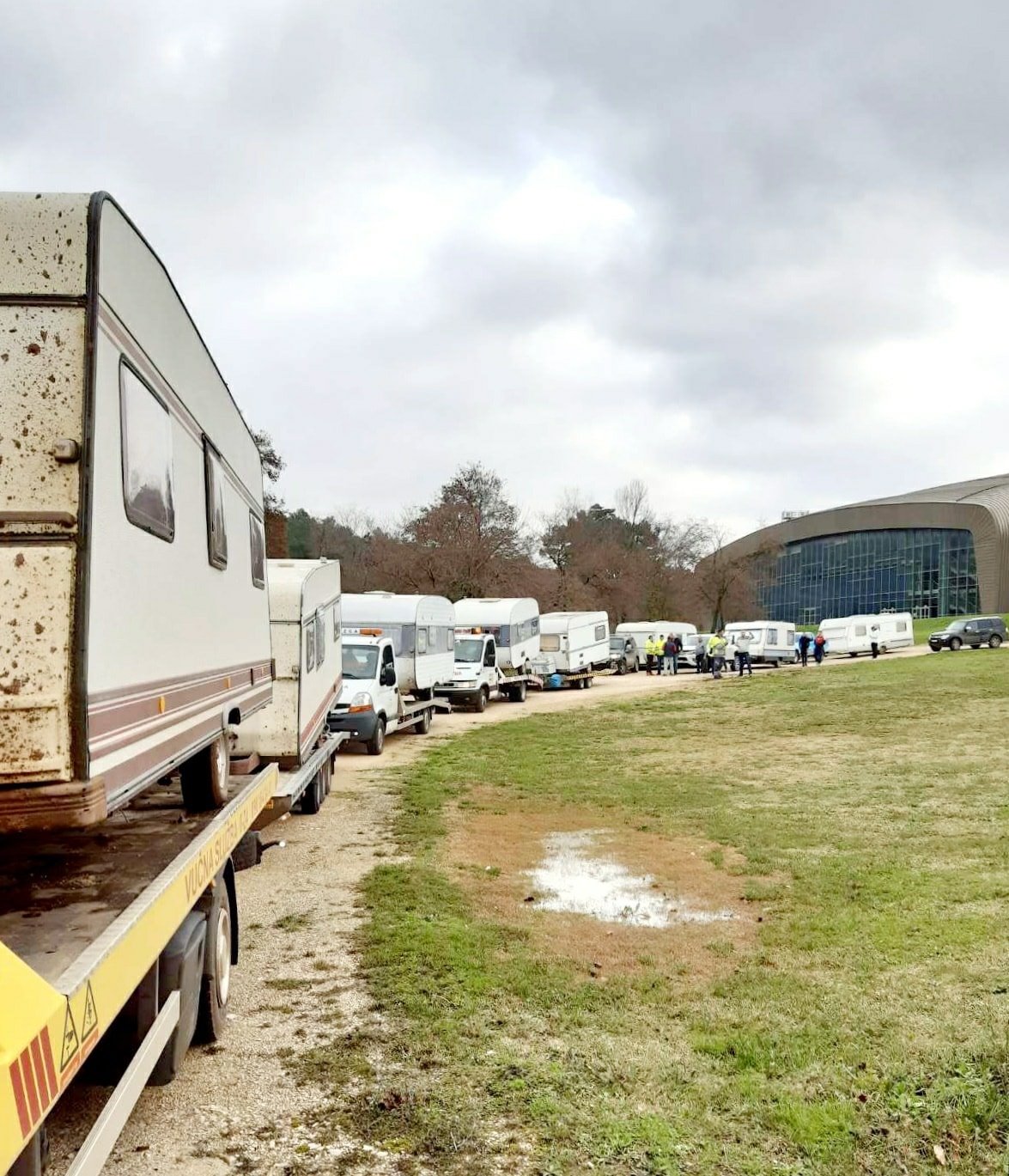
A convoy of caravans headed from Istria to Petrinja / Photo: the City of Poreč - Parenzo
This humanitarian action was initiated by Denis Bernobić from Poreč, the owner of a local towing service, together with the owner of a small family camp Polidor near Funtana, Adrian Ukušić. According to both of them, whom Jutarnji found in a convoy near Rijeka while transporting the first contingent of houses, this is just the beginning.
"Private owners of caravans responded to the action, and among them are even some Germans who have their caravan in the Bijela Uvala camp near Poreč. They called me and said they were giving their caravan away with all the papers. People immediately started appearing like crazy from all over Istria, so this is only the first contingent," says Bernobić, who set off for Petrinja and Glina on Wednesday together with colleagues with eight trucks, seven jeeps, and two vans.
They are driving caravans directly to people who were left without roofs and slept outside last night, and they have everything – toilets, beds, and heating.
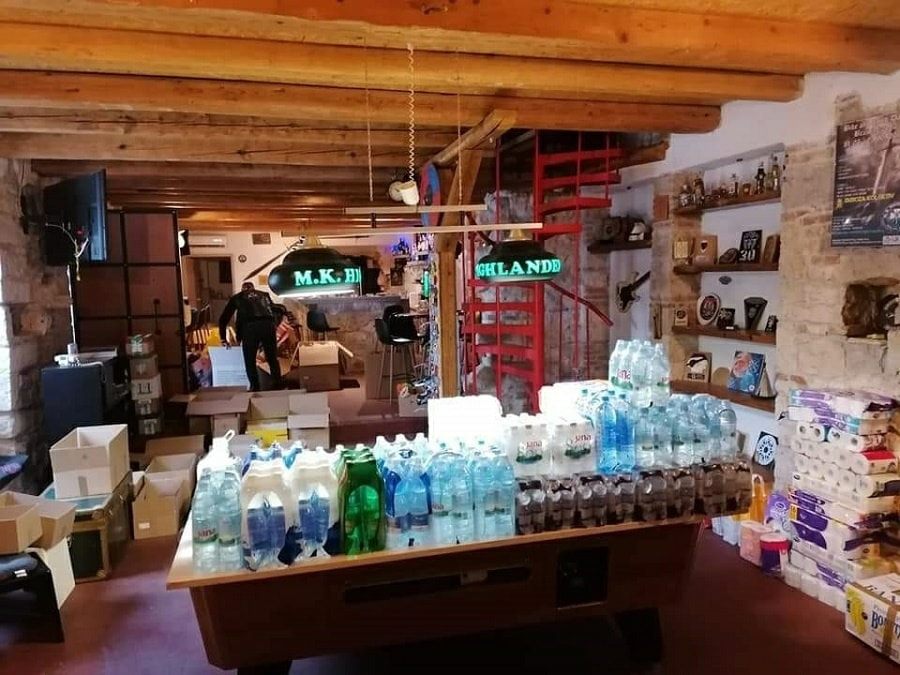
The caravans are equipped with food and drinks / Photo: the City of Poreč - Parenzo
"The caravans are also full of drinks and food. There are even wood and wood stoves inside. The van is full of bedding. Everyone helped us to equip them, and the Red Cross from Poreč and Rovinj were especially active, and I thank them for that," says Bernobić, whose phone keeps ringing.
"They keep calling me across all platforms because people want to give away their caravans. So we will drive towards Petrinja and Glina in the coming days as well. We expect to take about 40 caravans to the affected areas in the next few days. Colleagues from Koper and Slovenia who have a towing service also call me to help us take the campers, "points out Bernobić, who took similar action with Ukušić when Gunja was flooded.
The owner of Polidor was also with him in convoy, and he gave two of his camps. Mayor of Poreč Loris Peršurić also supported Bernobić.
"These are all donations from citizens from all over Poreč and beyond. Poreč Red Cross, local committees, and numerous associations and initiatives still collect all kinds of help. This is an unprecedented tragedy. The minimum we can do is help people whose homes have been destroyed, who are terrified, and whose horrors, unfortunately, are not over yet," Mayor Peršurić told Hina.
Follow our live updates on the situation in Croatia's earthquake-hit areas here; find out how you can donate here.
Minister: 150 Soldiers in the Field, 350 on Standby Ready to Help
ZAGREB, Dec 30, 2020 - Defence Minister Mario Banozic said on Wednesday that there were currently 150 troops in the quake-stricken areas in Petrinja, Sisak, and Glina and another 350 were on standby adding that the local barracks would be fully occupied by local residents whose homes were damaged in Tuesday's quake.
"At the moment there are about 150 soldiers in the field in Petrinja, Glina, Sisak, and in all municipalities that expressed their need for help at a meeting of the civil protection authority today. We also have another 350 soldiers on standby," Banozic said during a cabinet meeting.
There are also five helicopters, three are in Petrinja and two in Zagreb to ensure emergency medical transport. The thing that is needed the most today is heavy machinery to remove and demolish hazardous buildings.
He commended the army and civil protection units as well as the homeland security system for their prompt organization to tend to the people. He added that teams were dispersed so that as few of them were housed in the barracks while the others were on standby.
There is room for about 500 people at the Petrinja barracks and Banozic said that last night 315 people were accommodated there, particularly the elderly from aged care facilities. This morning an additional 15 to 20 elderly people arrived in the barracks.
"I have the feeling that the barracks will be filled by this evening because a lot of people did not know how to get to the barracks yesterday and some stayed in their homes not wanting to leave. It started to rain too so I believe that tonight the barracks will be full," he underlined.
Banozic said that the military headquarters building in Zagreb suffered some minor damage in Tuesday's earthquake and that they were waiting for structural engineers to inspect the damage.
President Zoran Milanovic, who is the supreme commander, on Wednesday toured the quake-hit areas and visited soldiers on the ground.
Albania Donates €250,000 to Croatia after Earthquake
ZAGREB, Dec 30, 2020 - Albania will donate €250,000 to Croatia for post-earthquake reconstruction, Prime Minister Edi Rama announced on Wednesday.
"Just signed the Government of Albania decree to donate 250k EURO to brotherly Croatia to help the rebirth of Petrinja after the devastating earthquake! Croatia is an example of resilience and a role model for us in its amazing transformation into a proud EU country," Rama tweeted.
A magnitude 6.4 earthquake struck Albania in November 2019, claiming 51 lives. On that occasion, Croatia sent rescue teams and search dogs and donated €1 million at a donor conference organized by the European Commission for the reconstruction of hospitals and schools.
The 6.2 quake that struck Croatia's Sisak-Moslavina County on Tuesday killed at least seven and injured dozens, destroying hundreds of houses in Petrinja, Glina, Sisak, and nearby towns and villages.
Croatian Company Valamar Offering Accommodation to Earthquake Victims
December the 30th, 2020 - The Croatian company Valamar Riviera, otherwise the largest tourism company in the country, has opened the doors of its facilities and offered accommodation to families who have lost their homes in the Petrinja earthquake.
As Poslovni Dnevnik, Petrinja, Sisak, Glina, and the surrounding areas are full of families who have lost their homes and everything they once held dear in the horrendous earthquake which struck Central Croatia. The giant Croatian company Valamar has responded quickly.
The compant has made its Istria Premium Camping Resort in Funtana near Porec, Jezevac Premium Camping Resort on the island of Krk and Hotel Valamar Sanfior in Rabac available to families from Sisak-Moslavina County who have lost their properties in the earthquake and have nowhere else to go. Accommodation in camping resorts, in fully equipped camping houses, is available from today, December the 30th, and in the hotel Sanfior on a full board basis from tomorrow, December the 31st, 2020.
All those who need accommodation or who would like more information and to make arrangements can call 052/465 000 or e-mail This email address is being protected from spambots. You need JavaScript enabled to view it..
The Office for Reconstruction and Housing: 230 housing units are ready to provide temporary accommodation to those who have lost their homes as a result of the earthquake.
The Central State Office for Reconstruction and Housing will make available 230 housing units for temporary accommodation of families in need, whose houses have been damaged or destroyed in Sisak-Moslavina County, from the available housing fund it manages.
The above was published on Wednesday on the website of the Central State Office, which states that, out of those 230 housing units, 44 housing units are equipped with furniture and household appliances.
For more, follow today's live updates. For more on how you can help by donating money, food, material and humanitarian aid, click here and here.


